Deadly Superbugs: Maple Syrup Could Help Combat Antibiotic Resistant Bacteria, Study Finds

A concentrated maple syrup extract helps antibiotics combat infection-causing bacteria by making the bacteria more susceptible to the drugs, researchers announced Thursday. Their results are promising, especially given the rising danger of antibiotic resistance, in which antibiotics are becoming increasingly ineffective against common infections.
Researchers at McGill University in Montreal, led by professor of chemical engineering Nathalie Tufenkji, discovered that antibiotics were more effective against E. coli and Proteus mirabilis when the drugs were combined with the maple syrup extract than when they were not. Both bacteria are common causes of urinary tract infections.
"The findings suggest a potentially simple and effective approach for reducing antibiotic usage," Tufenkji said in a release from the university. "I could see maple syrup extract being incorporated eventually, for example, into the capsules of antibiotics.” The researchers' findings are slated to be published in the journal Applied and Environmental Microbiology.
The maple syrup extract has been tested only in a lab setting so far, and Tufenkji said it was not possible to gauge how effective it could be on infection in humans until clinical trials were conducted.
The researchers bought the maple syrup at local Montreal markets and froze it before creating the extract, which was rich in phenolic compounds that are often found naturally in medicinal herbs and plants. Maple syrup is a concentrated form of sap from maple sugar trees.
The maple syrup extract appeared to weaken the bacteria in several ways. One was by destroying biofilms, which are colonies of bacteria and other microorganisms that can contribute to drug resistance in infections. Another was by repressing certain genes in bacteria that fueled resistance to antibiotics.
Researchers previously discovered that maple syrup contains health-boosting compounds that work like antioxidants and anti-inflammatories. One specific, if ironic, finding was that phenolic compounds found in maple syrup can help with management of Type 2 diabetes.
© Copyright IBTimes 2024. All rights reserved.






















